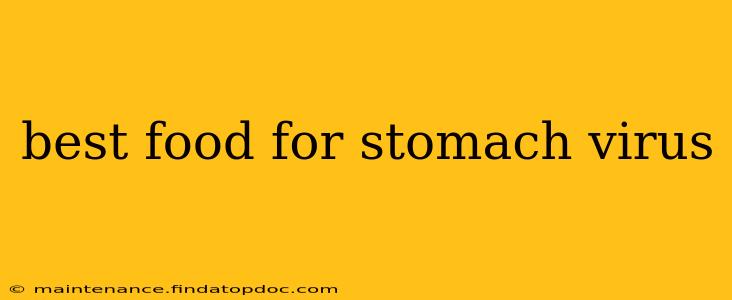A stomach virus, also known as gastroenteritis, can leave you feeling incredibly miserable. Nausea, vomiting, diarrhea, and stomach cramps are common symptoms that can quickly dehydrate you. While there's no magic cure, choosing the right foods can significantly ease your discomfort and help your body recover faster. This guide will explore the best foods for a stomach virus, focusing on easily digestible options that provide essential nutrients without irritating your sensitive digestive system. We'll also discuss what to avoid.
What to Eat When You Have a Stomach Virus?
The key during a stomach virus is to focus on bland, easily digestible foods that are gentle on your stomach. The goal is to rehydrate and replenish lost electrolytes without triggering further nausea or vomiting.
1. The BRAT Diet: A Time-Tested Approach
The BRAT diet—bananas, rice, applesauce, and toast—is a classic recommendation for stomach upsets. These foods are low in fiber and easy to digest, minimizing strain on your gut.
- Bananas: Provide potassium, an electrolyte often lost through diarrhea and vomiting.
- Rice: A simple carbohydrate that offers easily digestible energy. White rice is preferred over brown rice due to its lower fiber content.
- Applesauce: Provides pectin, which can help to bind stool and reduce diarrhea. Choose unsweetened varieties.
- Toast: Provides easily digestible carbohydrates and can help settle your stomach. Opt for plain, lightly toasted bread.
2. Other Gentle Options Beyond BRAT
While the BRAT diet is a good starting point, you can gradually introduce other bland foods as your symptoms improve. These include:
- Plain Crackers: Similar to toast, these provide easily digestible carbohydrates. Saltines are a common choice.
- Broth: Provides fluids and electrolytes, crucial for rehydration. Chicken broth, vegetable broth, or even bone broth are good options. Avoid broth with excessive seasonings.
- Plain Yogurt (with live and active cultures): Can help restore gut bacteria, although this may not be well-tolerated in the acute phase. Choose plain, unsweetened varieties.
- Gelatin: Jell-O or similar gelatin desserts can offer hydration and easily digestible nutrients.
What Foods to AVOID When You Have a Stomach Virus?
Certain foods can worsen symptoms and prolong your recovery. It's crucial to avoid these until your symptoms have significantly subsided:
- High-Fiber Foods: Fruits and vegetables (except bananas and applesauce in moderation), whole grains, and legumes can irritate your digestive system.
- Fatty or Greasy Foods: These are harder to digest and can exacerbate nausea and vomiting.
- Spicy or Acidic Foods: These can irritate your stomach lining and increase discomfort.
- Dairy Products (except plain yogurt): Lactose can be difficult to digest when your gut is already upset.
- Sugary Drinks and Caffeinated Beverages: These can dehydrate you further.
- Alcohol: Avoid alcohol completely as it can worsen dehydration.
How Long Should I Stick to a Bland Diet?
The duration of your bland diet depends on the severity of your symptoms. If your nausea and vomiting have subsided, you can gradually reintroduce other foods in small portions, paying attention to how your body reacts. If your symptoms return, revert to the blander options. Generally, you can expect to feel better within a few days, but full recovery might take a bit longer.
What if I'm Still Dehydrated?
Dehydration is a serious concern during a stomach virus. If you experience significant dehydration (excessive thirst, dizziness, dark urine), seek medical attention immediately. Oral rehydration solutions (ORS) can help replenish lost fluids and electrolytes. You can find these at most pharmacies.
Are there specific foods good for kids with stomach viruses?
The principles remain the same for children as for adults. Stick to the BRAT diet and other easily digestible options mentioned above. Offer small, frequent sips of fluids to prevent dehydration. For infants and young children, always consult a pediatrician before making significant dietary changes.
Can I use supplements to help with a stomach virus?
While a balanced diet is crucial, some individuals may consider probiotics (once the acute phase is over) to help restore gut flora. Always consult with your doctor or a registered dietitian before starting any supplements, especially if you have underlying health conditions.
By carefully choosing your foods and staying hydrated, you can ease the discomfort of a stomach virus and promote a quicker recovery. Remember, rest is also vital!
